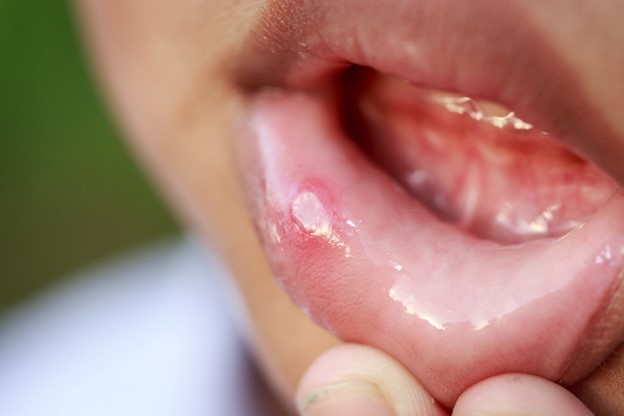Oral ulcers can be an unsettling experience for anyone. Often painful and inconvenient, they can disrupt daily routines. This guide aims to demystify these sores by offering essential information. Understanding what types of sores in the mouth entail, how they evolve, and how to handle them can reduce anxiety. We’ll delve into the symptoms of oral ulcers, their causes, and the effective treatments available, whether you’re in a busy city or a quiet village.
What are Oral Ulcers?
Oral ulcers, commonly known as mouth ulcers, are small lesions that occur in the mouth. They can appear on the inner cheeks, lips, or tongue. In India, these ulcers are quite common, affecting both urban and rural populations. Urban settings often see a rise in oral ulcers due to lifestyle factors, such as stress and diet preferences. Meanwhile, in rural areas, they can result from nutritional deficiencies and limited access to medical advice. By understanding these differences, we can better appreciate the gaps in preventing and treating these discomforts across different regions.
Importance of Understanding Oral Ulcers
Leaving oral ulcers untreated can significantly impact daily life. They cause discomfort while eating, drinking, or even speaking. Over time, persistent ulcers might indicate more serious health issues, highlighting the importance of early intervention.
Untreated ulcers can develop complications such as infections, causing additional pain and health risks. In some cases, they could be a sign of underlying conditions like gastrointestinal issues. Knowing early signs helps in seeking timely help, thus reducing potential risks. It’s crucial to address the types of sores in the mouth as soon as they appear.
Recognizing Symptoms of Oral Ulcers
The symptoms of oral ulcers can vary widely. You might experience burning or stinging sensations when consuming hot or spicy food. Ulcers appear as small, round, white or yellow sores with red borders.
- Pain and swelling: Discomfort in the affected area.
- Texture changes: Uneven or rough surfaces on the tongue or inner cheeks.
If these symptoms of oral ulcers persist beyond two weeks, it’s wise to consult a health professional. Understanding these symptoms aids in quick identification and prompt treatment.
Identifying Common Causes and Triggers
Oral ulcers can arise from various causes. Key factors include nutritional deficiencies, especially a lack of iron, vitamin B12, or folic acid prevalent in the typical Indian diet. Avoiding certain triggers can help minimize occurrence.
- Personal habits: Frequent consumption of spicy foods, which is common in Indian cuisine, can sometimes irritate the mouth lining.
- Allergies: Some individuals might experience mouth ulcers caused by reactions to specific foods or dental products.
Addressing these triggers by altering diet or daily habits becomes crucial in managing and reducing oral ulcers.
Impact of Seasonal and Climatic Changes on Oral Health
In India, the climate plays a role in oral health. During dry seasons, the likelihood of developing oral ulcers can increase due to dehydration.
- Winter: Cold weather often leads individuals to consume hot foods that might irritate sensitive areas in the mouth.
- Monsoon: Increased humidity can create a breeding ground for bacteria, exacerbating ulcer formation.
To manage oral health challenges amid these changes, ensure regular hydration and mild food consumption. Adjusting oral care routines to include gentle toothpastes and rinses helps in maintaining balance.
Exploring Treatment Options
Fortunately, there are numerous ways to address oral ulcers, ranging from home remedies to medical interventions. Traditional Indian remedies, such as rinsing the mouth with turmeric water or applying ghee to the ulcers, can be effective.
For more persistent issues, over-the-counter gels available in most pharmacies provide relief. Consulting dentists for oral ulcers might lead to prescribed medications or specific treatments.
In extensive cases, identifying the underlying cause can direct proper medical strategies. Regardless of severity, a combination of home care and professional advice usually yields effective results.
Effective Prevention Strategies and Oral Hygiene
Adopting regular oral hygiene routines can significantly prevent oral ulcers. It’s important to use a soft-bristle toothbrush and fluoride toothpaste.
- Dietary adjustments: Include foods high in vitamins and minerals, such as green leafy vegetables and dairy products.
- Avoid irritants: To reduce ulcer risk, steer clear of excessively spicy or acidic foods.
By focusing on these preventative measures, individuals can effectively protect themselves from uncomfortable mouth ulcers.
Concluding Thoughts on Oral Ulcers Management
Navigating the world of oral ulcers doesn’t have to be daunting. By implementing regular oral hygiene practices and being aware of symptoms, you can tackle mouth ulcer types proactively. Encourage routine dental check-ups and don’t hesitate to seek advice for persistent issues. A better understanding of oral ulcers brings about healthier, comfortable living conditions.
Struggling with oral ulcers? Visit Sehat Hospitals for expert care and personalized treatment options to keep your mouth healthy and pain-free!

